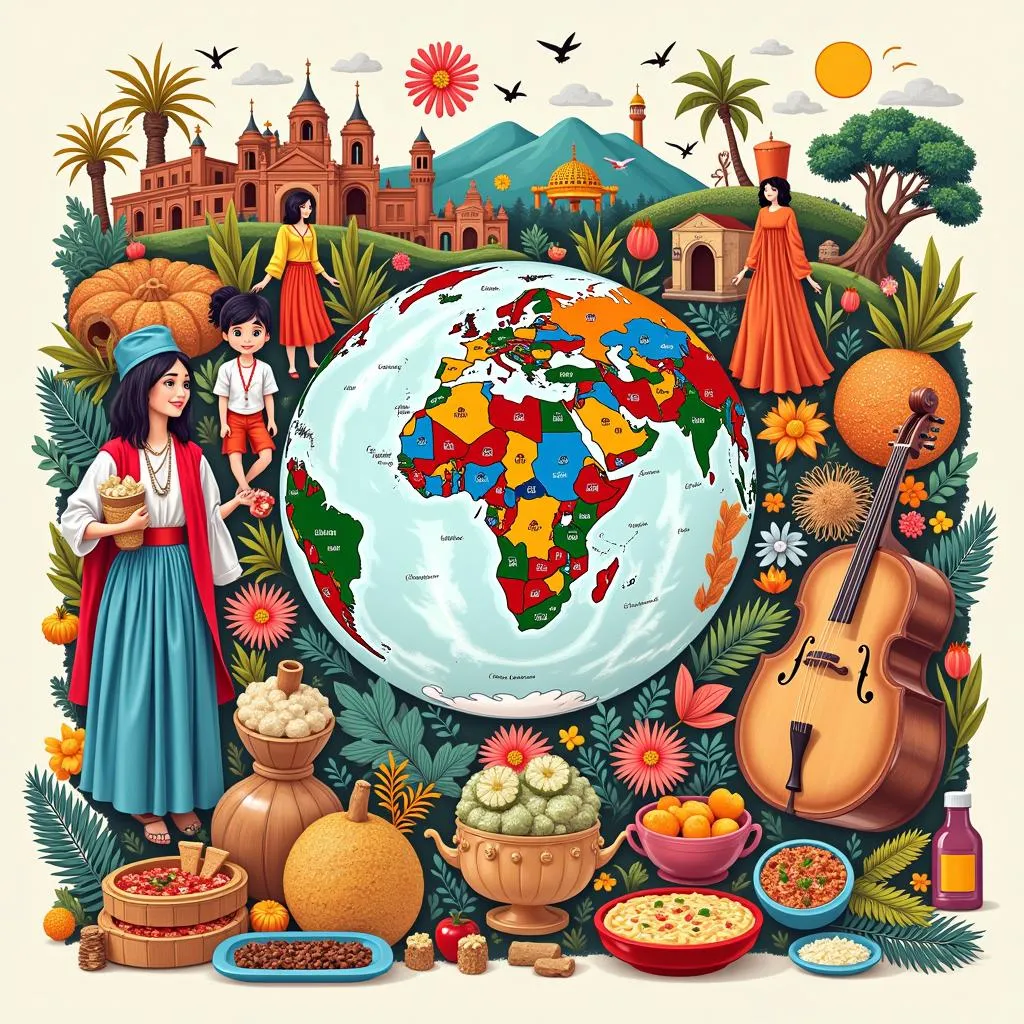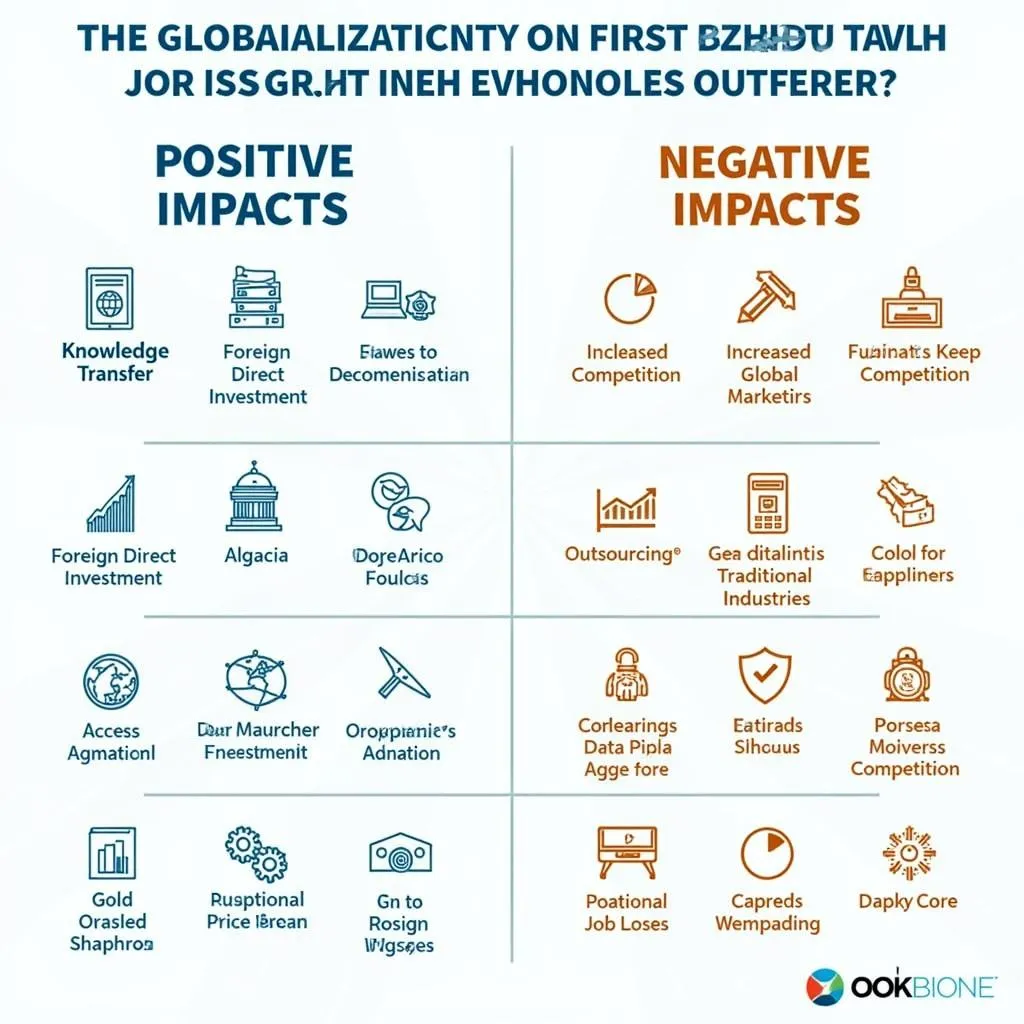Globalization and its impact on economic development is a recurring theme in IELTS Writing Task 2. This topic has appeared frequently in past exams and is likely to continue being a popular choice for future tests. Its relevance to current global affairs and its multifaceted nature make it an ideal subject for assessing candidates’ critical thinking and writing skills. Let’s explore a specific question related to this theme and analyze sample responses across different band scores.
Nội dung bài viết
Some people think that globalization is harmful to local cultures and traditions. To what extent do you agree or disagree?
Analyzing the Question
This question requires candidates to express their opinion on the impact of globalization on local cultures and traditions. It’s a classic agree/disagree essay type, where you need to clearly state your position and support it with relevant examples and reasoning.
Key points to consider:
- Define globalization in the context of cultural impact
- Identify potential positive and negative effects on local cultures
- Consider both sides of the argument before stating your position
- Provide specific examples to support your viewpoint
How globalization affects traditional economies is a crucial aspect to consider when addressing this question. Understanding the economic implications can help form a more comprehensive response.
Sample Essay – Band 8
Globalization, the process of increased interconnectedness and interdependence of world cultures and economies, has been a subject of intense debate regarding its impact on local cultures and traditions. While some argue that it poses a threat to cultural diversity, I largely disagree with this view and believe that globalization can actually enrich and revitalize local cultures when approached mindfully.
Undeniably, globalization has led to some degree of cultural homogenization. The spread of multinational corporations, global media, and the internet has resulted in the adoption of similar lifestyles, fashion trends, and consumption patterns across different countries. This has led to concerns about the erosion of unique cultural identities and the loss of traditional practices.
However, I contend that globalization also offers significant benefits to local cultures. Firstly, it provides a platform for cultural exchange and mutual understanding. Through increased travel, digital connectivity, and international collaborations, people can now experience and appreciate diverse cultures more easily than ever before. This exposure often leads to a renewed interest in one’s own cultural heritage and a desire to preserve and promote it on a global stage.
Moreover, globalization can act as a catalyst for cultural innovation and adaptation. Local artisans and cultural practitioners are finding new markets for their traditional products and art forms, adapting them to contemporary tastes while maintaining their essence. For instance, traditional Indian yoga has gained worldwide popularity, leading to its revitalization and evolution within India itself.
Furthermore, the economic opportunities brought about by globalization can actually help in preserving local cultures. Increased tourism and international trade often incentivize communities to maintain and showcase their unique cultural assets, providing financial support for cultural preservation efforts.
In conclusion, while globalization does present challenges to local cultures, its overall impact can be positive if managed thoughtfully. The key lies in striking a balance between embracing global connectivity and preserving cultural uniqueness. By doing so, communities can harness the benefits of globalization to strengthen and share their cultural heritage on a global platform.
(Word count: 309)
 Globalization as a platform for cultural exchange
Globalization as a platform for cultural exchange
Sample Essay – Band 7
In today’s interconnected world, the impact of globalization on local cultures and traditions has become a topic of heated debate. While some people argue that globalization poses a threat to cultural diversity, I partially agree with this view, recognizing both the challenges and opportunities it presents.
On one hand, globalization has undoubtedly led to some level of cultural homogenization. The widespread adoption of Western fashion, fast food chains, and popular culture has resulted in a certain uniformity across different countries. This trend can potentially overshadow local traditions and customs, especially among younger generations who are more exposed to global influences.
However, it’s important to note that globalization also offers opportunities for cultural preservation and exchange. The internet and social media platforms allow communities to showcase their unique traditions to a global audience, fostering appreciation and interest in diverse cultures. For example, traditional crafts from developing countries can now find international markets, providing economic incentives to maintain these practices.
Moreover, globalization has led to increased awareness of the importance of cultural heritage. Many countries are now making conscious efforts to preserve their traditions in the face of global influences. This has resulted in a resurgence of interest in local languages, arts, and customs among both locals and tourists.
That being said, the negative impacts of globalization on local cultures cannot be ignored. Smaller, indigenous communities may struggle to maintain their way of life in the face of economic pressures and modernization. Additionally, the dominance of a few global languages, particularly English, can lead to the decline of local languages and the cultural knowledge they embody.
In conclusion, while globalization does pose some threats to local cultures and traditions, its impact is not entirely negative. The key lies in finding a balance between embracing global connectivity and preserving cultural uniqueness. By doing so, communities can benefit from the opportunities of globalization while maintaining their distinct cultural identities.
(Word count: 309)
Sample Essay – Band 6
Globalization is a big topic in today’s world. Some people think it is bad for local cultures and traditions. I agree with this idea to some extent, but I also think there are some good things about globalization for cultures.
First, globalization can make cultures more similar. Many people around the world wear the same clothes, eat the same food, and watch the same movies. This can make local traditions less important, especially for young people. For example, in my country, fewer people wear traditional clothes now because they prefer international fashion brands.
However, globalization also has some good effects on cultures. It helps people learn about other cultures and share their own culture with others. The internet makes it easy for people to show their traditions to the world. This can make people more interested in their own culture and want to keep it alive.
Another good thing is that globalization can help local businesses. Traditional products can be sold to people in other countries. This gives people a reason to keep making these products and keep their traditions alive. For example, traditional handicrafts from my country are now popular in many other countries.
But there are also some problems. Small communities might find it hard to keep their way of life when big companies come to their area. Also, many people are starting to speak English instead of their local language, which can be bad for their culture.
In conclusion, I think globalization has both good and bad effects on local cultures and traditions. It’s important to try to keep the good parts of globalization while also protecting local cultures. This way, we can have a world that is both connected and diverse.
(Word count: 282)
 Preserving local traditions in a globalized world
Preserving local traditions in a globalized world
Explaining the Band Scores
Band 8 Essay:
This essay demonstrates excellent control of language and presents a well-developed argument. Key strengths include:
- Clear position with a nuanced perspective
- Coherent structure with each paragraph developing a distinct idea
- Wide range of vocabulary used accurately (e.g., “cultural homogenization”, “catalyst for cultural innovation”)
- Complex sentence structures used effectively
- Relevant examples to support arguments
- Strong conclusion that summarizes the main points and offers a balanced view
Band 7 Essay:
This essay shows a good command of language and presents a clear argument. Strengths include:
- Clear position acknowledging both sides of the argument
- Good organization with each paragraph focusing on a specific point
- Adequate range of vocabulary (e.g., “cultural homogenization”, “indigenous communities”)
- Mix of simple and complex sentence structures
- Relevant examples provided
- Conclusion that summarizes the main points
The main difference from the Band 8 essay is in the depth of analysis and the sophistication of language use.
Band 6 Essay:
This essay demonstrates an adequate grasp of the task and presents a relevant argument. Key features include:
- Clear position on the topic
- Basic organization with each paragraph discussing a different aspect
- Limited but adequate vocabulary for the task
- Mostly simple sentence structures with some attempts at complexity
- Some examples provided, though less specific than higher band essays
- Basic conclusion restating the main points
The essay lacks the depth and language sophistication of higher band scores but successfully addresses the task.
Key Vocabulary to Remember
- Globalization (noun) /ˌɡləʊbəlaɪˈzeɪʃən/ – the process by which businesses or other organizations develop international influence or start operating on an international scale
- Cultural homogenization (noun phrase) /ˌkʌltʃərəl həˌmɒdʒənaɪˈzeɪʃən/ – the reduction in cultural diversity through the popularization and diffusion of a wide array of cultural symbols
- Interdependence (noun) /ˌɪntədɪˈpendəns/ – the dependence of two or more people or things on each other
- Erosion (noun) /ɪˈrəʊʒən/ – the gradual destruction or diminution of something
- Revitalization (noun) /ˌriːvaɪtəlaɪˈzeɪʃən/ – the action of imbuing something with new life and vitality
- Indigenous (adjective) /ɪnˈdɪdʒɪnəs/ – originating or occurring naturally in a particular place; native
- Cultural heritage (noun phrase) /ˈkʌltʃərəl ˈherɪtɪdʒ/ – the legacy of physical artifacts and intangible attributes of a group or society
- Adaptation (noun) /ædæpˈteɪʃən/ – the process of changing to suit different conditions
 Celebrating global cultural diversity
Celebrating global cultural diversity
In conclusion, the topic of globalization and its impact on local cultures and traditions is a complex and nuanced one that requires careful consideration of multiple perspectives. As you prepare for your IELTS Writing Task 2, practice addressing similar questions that explore the interplay between global influences and local identities. Some potential future topics might include:
- The role of technology in preserving or eroding cultural traditions
- The impact of international tourism on local communities and their cultures
- The balance between economic development and cultural preservation in developing countries
- The effects of global media on local cultural production and consumption
Remember to always analyze the question carefully, plan your response, and support your arguments with specific examples. Feel free to practice writing an essay on the topic discussed in this article and share it in the comments section for feedback and discussion. This active practice is an excellent way to improve your writing skills and prepare for the IELTS exam.


